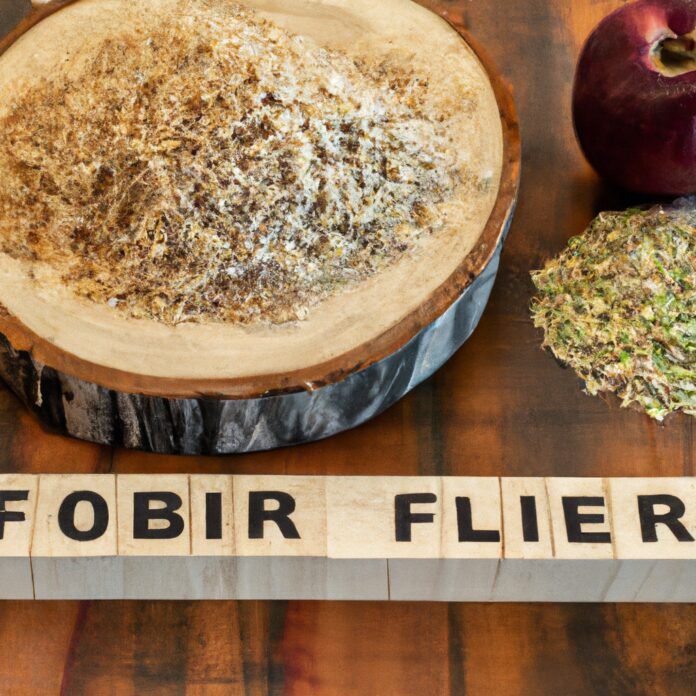We all know that having a balanced diet is important for a healthy lifestyle, but did you ever wonder what the secret ingredient is that brings it all together? Fiber! Fiber plays an integral role in supporting your body’s optimal functioning, and this article will help you understand how it does and why it’s so important.
1. Feeding the Body’s Unsung Hero: Unveiling the Wonders of Fiber in a Balanced Diet
Fiber is an essential part of any balanced diet, but is also often an overlooked or misunderstood nutrient. Many of us tend to think of fiber simply as a necessary part of maintaining regularity, but there are many more health benefits associated. From reducing inflammation to balancing blood sugar levels, eating enough fiber is fundamental for optimal health and wellbeing.
The recommended intake of fiber for adults is between 21-38 grams a day, though the average American eats only half of that amount. As such, it’s important to understand the sources and types of fiber available to us and why they are integral to a healthy lifestyle.
The two main types of dietary fiber are soluble fiber and insoluble fiber. Soluble fiber breaks down easily and helps to reduce cholesterol and feebleness. Eating foods that are high in soluble fiber will help to keep cholesterol levels down and release energy more slowly, allowing for an even balance of blood sugar. This can be immensely beneficial for those with diabetes, or those looking to maintain a steady energy level throughout the day.
Insoluble fiber does not dissolve in water, and helps to move waste through the digestive tract in order to prevent constipation. It can also help to eliminate toxins from the body. Eating a combination of both types of fiber helps to create the optimal balance for a healthy gut.
When it comes to food sources, most fruits, vegetables, nuts, seeds, whole grains and legumes are good sources of fiber. It is best to have a balance of these nutrients in your diet in order to reap the many health benefits of dietary fiber.
- Fruits such as apples, berries, pears and oranges are excellent sources of fiber.
- Vegetables like broccoli, brussels sprouts, green beans and spinach are all rich in fiber.
- Whole grains like oatmeal, wild rice, quinoa and buckwheat are great additions to your diet.
- Legumes such as chickpeas, lentils and black beans provide a great source of fiber as well.
- Nuts and seeds including chia, flaxseed, almonds and walnuts are also high in fiber.
Making sure to incorporate enough fiber into your daily diet is essential for optimal health and wellbeing, and can help to reduce the risk of illnesses such as diabetes, heart disease and colon cancer. Eating enough fiber not only helps to maintain regularity, but can also reduce cholesterol levels and promote overall better health.
2. Weaving Wellness: The Essential Role of Fiber in Supporting a Healthy Lifestyle
Fiber, although often overlooked, plays an essential part in establishing and maintaining a healthy lifestyle. From aiding digestion to curbing hunger, our dietary fiber works wonders in helping us achieve our wellness goals.
Perhaps one of the most striking advantages of dietary fiber is its ability to support regular digestion. It binds with water, promoting the formation of softer stool and preventing constipation. Fiber also absorbs toxins, thus further protecting the GI tract from exposure to hazardous substances.
Fiber also helps control weight and curb food cravings. Low-calorie foods high in fiber tend to make one feel full, thus decreasing calorie intake associated with snacking. Additionally, fiber slows down the digestion process, leading to feelings of fullerness for longer.
Finally, fiber plays an important role in the prevention of various chronic diseases, such as heart disease and stroke. Research shows that regular consumption of fiber lowers cholesterol levels, reduces the risk of diabetes, improves blood sugar levels, and reduces the risk of certain gastrointestinal cancers.
In order to reap all these health benefits, it is essential to bolster your diet with an adequate amount of fiber. Here are some simple tips for doing so:
- Eat a variety of fruits, vegetables, and whole grains.
- Choose fiber-rich snacks, such as seeds, nuts, and popcorn.
- Opt for high-fiber breakfast foods, like oatmeal, bran cereals, and whole-grain toast.
- Make sure to drink plenty of water throughout the day.
- Avoid processed foods and refined grains.
Adding more fiber to your diet may seem daunting, but the rewards are considerable. With dietary fiber you can give your body the nourishment it needs to stay healthy and lead a fulfilling life.
3. Nourishing from Within: Unleashing the Power of Fiber for Optimal Health and Well-being
The importance of fiber for optimal health and wellbeing cannot be overstated. Eating a variety of high-fiber foods boosts your metabolism, regulates your blood sugar, lowers cholesterol, and helps you maintain a healthy weight. But it is equally important to nourish yourself from within: fibers can help you absorb essential nutrients and reach and maintain a healthy weight. Here are some tips on how to get the most out of this powerful macro nutrient:
- Eat Whole Foods: Whole foods contain fiber in its natural form, along with a variety of vitamins, minerals, and other nutrients. Eating a variety of fruits, vegetables, nuts, beans, and whole grains provides you with all the essential fiber you need in a single meal.
- Drink Plenty of Water: Drinking enough water helps fiber be more effective in the travel through your digestive system. Make sure to drink plenty of water throughout the day for optimal health and wellbeing.
- Increase Your Fiber Intake Gradually: Increasing your fiber intake too quickly can lead to digestive discomfort. It’s important to increase your intake gradually, over a few weeks, to give your body time to adjust.
The amount of fiber you need each day may depend on factors like age, sex, and activity level, so it is important to consult a medical professional to work out an optimal intake for you. Your doctor may recommend a diet rich in whole grains, fruits, vegetables, and legumes, and supplementing with dietary fibers if necessary.
Fiber is an essential nutrient for maintaining optimal health and wellbeing, and it is important to nourish yourself from within. Eating a balanced, whole-foods based diet and supplementing with fiber if necessary can help you reach and maintain a healthy weight and reap all the benefits fiber has to offer.
4. Unlocking Nature’s Secret Weapon: Embracing the Crucial Benefits of Fiber for a Balanced Diet
Powerful Probiotic Superstars
Your body needs its fair share of probiotic-rich food to stay healthy and balanced. Eliminating processed and unhealthy sugar laden foods is the best place to start. Pile on top of that some wholesome fiber-rich foods such as legumes, fresh vegetables, and whole grains and you’ll be setting the course to a healthier future.
A Fiber-Fueled Future
Fiber is the powerhouse of nutrition to help your health thrive. Studies have found that health benefits of a high-fiber diet include decreased risk of colon cancer, improved digestive health, and improved blood sugar control. Emerging research also suggests that fiber may positively impact weight loss and even boost your immunity.
The Soaring Impact of Soluble and Insoluble Fiber
There are two main types of fiber: soluble and insoluble. Insoluble fiber bulks up stool, adding valuable hydration during digestion. Soluble fiber slows down digestion, giving your body more time to absorb all the nutrients.
The combined impact of these two types of fiber can have a soaring effect on your overall well-being. Plus, if you’re still looking to snack between meals, keep in mind that fiber-rich foods often have fewer calories than many other options.
Become A Fiber Superhero
It’s not hard to add fiber to your daily meals. Here are a few tasty suggestions:
- Toss a handful of nuts or seeds into your morning cereal
- Substitute brown rice or quinoa for white pasta or rice
- Sip on some vegetable-based smoothies throughout the day
- Add fresh fruits or vegetables to your lunchtime salads
- Choose whole wheat bread for sandwiches and toast
Fiber is nature’s way of helping your body thrive. Adding some fiber to your diet is a simple and effective way to unlock its crucial benefits.
Fiber is an essential component of a balanced diet. Eating plenty of fiber can help to reduce cholesterol, regulate blood sugar levels, and keep your gut healthy. Now that you have a better understanding of the importance of fiber, you can make sure to include plenty of it in your diet every day. So make sure to get your daily intake of fiber for a healthier and happier life!



